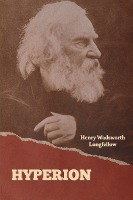Hyperion: A Romance is one of Henry Wadsworth Longfellow's earliest works, published in 1839. It is a prose romance which was published alongside his first volume of poems, Voices of the Night.Hyperion follows a young American protagonist named Paul Flemming as he travels through Germany. The character's wandering is partially inspired by the death of a friend. The author had also recently lost someone close to him. Longfellow's first wife, Mary Storer Potter, died in Rotterdam in the Netherlands after a miscarriage in 1836; Longfellow was deeply saddened by her death and noted in his diary: "All day I am weary and sad ... and at night I cry myself to sleep like a child."Hyperion was inspired in part by his trips to Europe as well as his then-unsuccessful courtship of Frances Appleton, daughter of businessman Nathan Appleton. In the book, Flemming falls in love with an Englishwoman, Mary Ashburton, who rejects him. (wikipedia.org)About the author:Henry Wadsworth Longfellow (February 27, 1807 - March 24, 1882) was an American poet and educator. His original works include the poems "Paul Revere's Ride", "The Song of Hiawatha", and "Evangeline". He was the first American to completely translate Dante Alighieri's Divine Comedy and was one of the fireside poets from New England.Longfellow was born in Portland, District of Maine, Massachusetts (now Portland, Maine). He graduated from Bowdoin College and became a professor there and, later, at Harvard College after studying in Europe. His first major poetry collections were Voices of the Night (1839) and Ballads and Other Poems (1841).He retired from teaching in 1854 to focus on his writing, and he lived the remainder of his life in the Revolutionary War headquarters of George Washington in Cambridge, Massachusetts.His first wife, Mary Potter, died in 1835 after a miscarriage. His second wife, Frances Appleton, died in 1861 after sustaining burns when her dress caught fire. After her death, Longfellow had difficulty writing poetry for a time and focused on translating works from foreign languages. Longfellow died in 1882.Longfellow wrote many lyric poems known for their musicality and often presenting stories of mythology and legend. He became the most popular American poet of his day and had success overseas. He has been criticized for imitating European styles and writing poetry that was too sentimental. (wikipedia.org)

